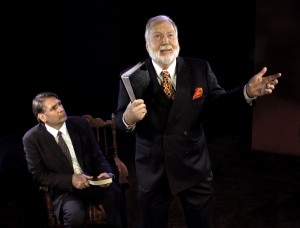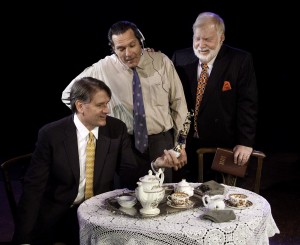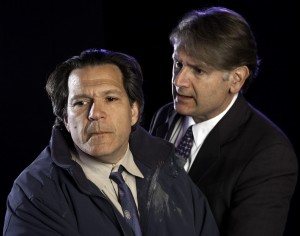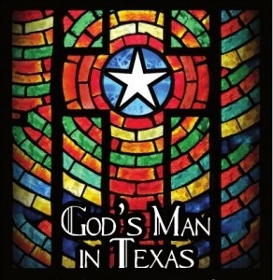A PLAY WHICH FALLS ON ITS FAITH
Faith is one of the most prevalent themes in David Rambo’s God’s Man in Texas, and very likely where you place your faith or where you spend your Sunday mornings will inform your opinions of this production. On the one hand it is a dramatized sermon. On the other, as Mr. Rambo states in the program, it is an allegorical recreation of the Holy Trinity. While the latter may be accurate, there are some things in this production that, regardless of one’s faith, are left unresolved, and often hinder the greater intention of the playwright.
 Directed by Nancy Youngblut, this two-hour-plus production tells the story of two rivaling pastors, Doctors Philip J. Gottschall (Ted Heyck) and Jeremiah Mears (Christian Lebano), who are each trying to gain or maintain control of Houston’s Rock Baptist Church, one of the largest congregations in Texas — and presumably the country. Gottschall is the incumbent, representative of the old, and Mears is the younger up-and-comer. To complete the three man show is Hugo Taney (Paul Perri), an assistant to both pastors. Mr. Perri shines as Hugo, but it doesn’t hurt that his is the only character who displays troubles that we can relate to. Mears and Gottschall perform more like idealized superstars than actual people; with the exception of some powerhouse showdowns, there is little to bridge their ambitions to our own.
Directed by Nancy Youngblut, this two-hour-plus production tells the story of two rivaling pastors, Doctors Philip J. Gottschall (Ted Heyck) and Jeremiah Mears (Christian Lebano), who are each trying to gain or maintain control of Houston’s Rock Baptist Church, one of the largest congregations in Texas — and presumably the country. Gottschall is the incumbent, representative of the old, and Mears is the younger up-and-comer. To complete the three man show is Hugo Taney (Paul Perri), an assistant to both pastors. Mr. Perri shines as Hugo, but it doesn’t hurt that his is the only character who displays troubles that we can relate to. Mears and Gottschall perform more like idealized superstars than actual people; with the exception of some powerhouse showdowns, there is little to bridge their ambitions to our own.
The play is divided into two modes of storytelling: preaching to the audience and preaching to one another, but that is the source of the major problem with this production. What is intended as a father/son power struggle often comes across wordy with only mild flashes of interest. And very often that interest loses its meaning with performances that do not effectively convey their character’s positions. Mr. Lebano’s wide-eyed portrayal of a 40- or 50-year-old finally-made-it- to-big-time pastor lacks authenticity (and if he is in charge of one of the largest religious movements of our time than that above all, is the most frightening message of this play).
to-big-time pastor lacks authenticity (and if he is in charge of one of the largest religious movements of our time than that above all, is the most frightening message of this play).
Another problem is the confused timeline. References to George Bush, Sr. and President Clinton frequently stand in direct opposition to chirping iPhones and Tim Tebow namedrops. When God’s Man in Texas debuted 14 years ago at the Humana Festival of New American Plays in Louisville, evangelism — and evangelism depicted in the arts — were in vogue. These days, however, not so much. Ms. Youngblut’s decision to make the story contemporary strips it of its bite, confuses the narrative, and does not come across as believable. This play would have been much more effective had it chosen a single era to focus on.
Outside of this reviewer’s opinion on the content, however, this is a production with some notable positives. The set and lights by D. Martyn Bookwalter — which transition from flatly lit pastor’s office to shadowy pulpit to convivial flashing lights of a street parade — are a pleasurable and imaginative treat. Youngblut’s staging is  clean and easy to follow. The pulpit that sits above us, the audience, is easily the most dominant motif and the one that holds the greatest relevance for the play in general. More than just an audience, we are a congregation to this production.
clean and easy to follow. The pulpit that sits above us, the audience, is easily the most dominant motif and the one that holds the greatest relevance for the play in general. More than just an audience, we are a congregation to this production.
If there is one refrain more prevalent than the Elijah passages that bookend this performance it is the mantra that “Winners win and Losers lose,” stated frequently by Mears. The struggle to be the obedient son in a job position searching for metaphorical fathers is a fascinating prospect to analyze, just not so much to bear witness to at the Sierra Madre Playhouse — depending on one’s faith, that is.
photos courtesy of Sierra Madre Playhouse
God’s Man in Texas
Sierra Madre Playhouse
scheduled to end on May 18, 2013
for tickets, call (626) 355-4318 or visit http://www.sierramadreplayhouse.org
